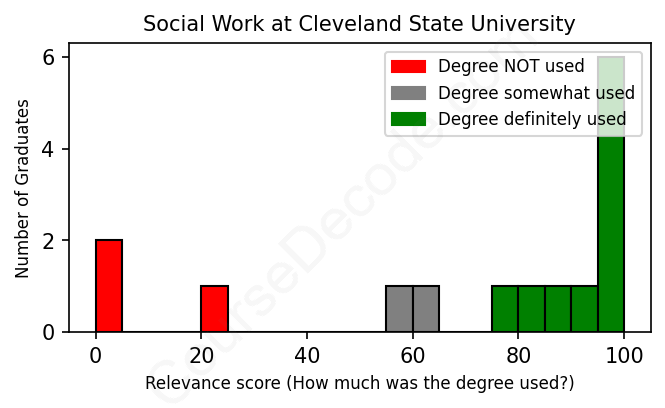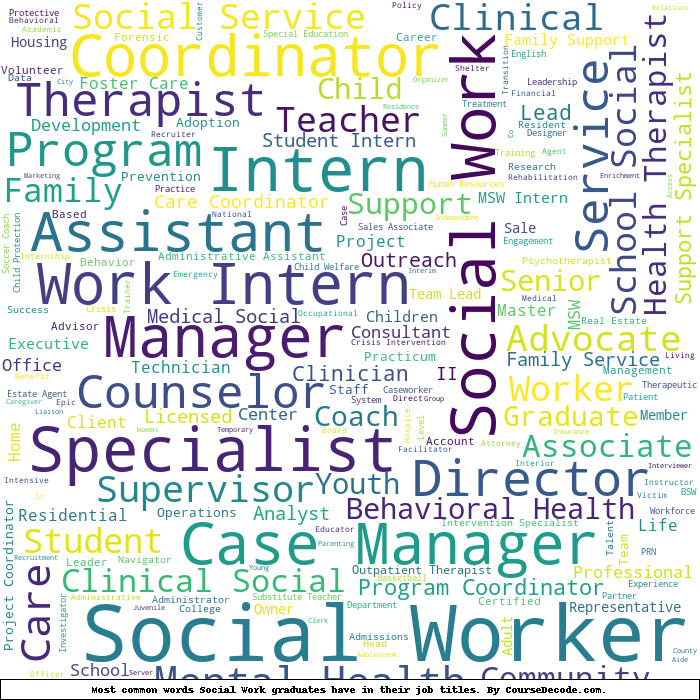
First, some facts. Of the Social Work graduates from Cleveland State University we've analyzed , here's how many have used (or NOT used) their degree in their career:

These are estimates based on AI analysis of 15 LinkedIn profiles (see below).
The verdict? Slightly above average. Overall, with an average relevance score of 72%, Social Work graduates from Cleveland State University have a slightly higher likelihood (+5%) of finding work in this field compared to the average graduate across all fields:
And for comparison, here's the chart for all profiles we've looked at across all degrees.
Also, after graduating, 53% of these graduates have pursued further education other than another Bachelor's degree (such as a Masters degree or other), compared to the average across all profiles of 35%. This suggests you may need more than just a Bachelors degree to be competitive as a Social Work graduate.
See the details:
|
Relevance score: 100% We think this person has gone into a career highly relevant to their degree. We think this person has gone into a career highly relevant to their degree.
DEGREE INFOGraduated in 2015 from Cleveland State University with a Bachelors Degree in Social Work. No other secondary education since. JOB HISTORY SINCE GRADUATIONFamily Preservation Service Caseworker St. Joseph's Regional Medical Center Feb 2016 - Aug 2017 ABOUTCertified Social Worker in the State of New JerseyBachelor of Social Work acquired from Cleveland State University.Specialties: Case management, customer service, communications, store management |
The top 10 most common jobs done by the graduates we've analyzed (ranked most common to least) are:
So, if we take a look at the job paths for graduates from Cleveland State University with a degree in Social Work, we can see a pretty wide range of occupations. A lot of them ended up in roles that are directly related to social work, like Case Managers, Social Workers in various specialized fields (like oncology and medical settings), and positions focused on community advocacy. These jobs usually require the essential social work skills of communication, empathy, and problem-solving, which are the backbone of what they studied. On the other hand, there are quite a few graduates who’ve drifted into roles that don't seem to touch social work much at all, like Property Managers, Salespeople, or Operational Managers, where the focus is more on business and sales skills rather than helping people or communities directly.
Overall, while many graduates are using their degree in ways that make a real difference in people’s lives through social work, a significant number also seem to veer off into unrelated fields. It suggests that while the degree provides solid skills applicable to various jobs, not everyone finds their way back to the core mission of social work. So, for those interested in genuinely making an impact, it’s important to seek out opportunities that align closely with the principles and practices learned during their time in school!
Here is a visual representation of the most common words in job titles for Social Work graduates (this is across all Social Work graduates we've analyzed, not just those who went to Cleveland State University):

Looking at the career trajectories of graduates from the Social Work program at Cleveland State University, it’s clear that many of them do start off in jobs that are closely related to their field. Right after graduation, you typically see positions like case managers, social workers, and support roles at various organizations. For instance, many graduates land roles where they assist vulnerable populations, coordinate services, or manage social programs. This kind of entry-level work is pretty standard and sets a solid foundation for their careers in social work or related fields.
Fast forward five to ten years, and the picture becomes more varied. Some graduates stick to the same path, advancing in social work and landing specialized positions like medical social workers or program managers, often within health or charity organizations. However, there are also a fair number who transition into less traditional roles, like property management or academic advising, which might not directly align with their social work training. It's encouraging to see that many are making meaningful contributions in social work-related roles, but there are also instances where graduates veer off into careers that range from housing to finance. So, while some find great opportunities aligned with their degree, others find themselves taking a different route altogether. Overall, it's a mixed bag, but a significant portion remains dedicated to making a difference in social work or community-based initiatives.
Honestly, a Bachelor’s degree in Social Work can be a bit of a mixed bag, and it's not generally considered one of the hardest majors out there, but it definitely has its challenges. At Cleveland State University, like many places, you’ll dive into a lot of coursework that involves understanding human behavior, social systems, and ethics, which can get pretty intense. You’ll also have to complete practical fieldwork, which is super important but can be time-consuming and emotionally demanding. So, while it's definitely manageable and many students find it rewarding, it does require a good amount of dedication and passion for the subject. Just be prepared for some heavy reading, writing, and interacting with real-world situations!
Most commonly, in the LinkedIn profiles we've looked at, it takes people 2 years to finish a Bachelor degree in Social Work.
Looking at the job paths of these Social Work graduates from Cleveland State University, it's a mixed bag when it comes to making decent money. Some have moved into roles with progressively higher responsibility, like the property manager who climbed the ladder at The Coral Company, and the academic advisor who eventually became a co-director at a college. These positions usually offer better pay, especially in management. However, a lot of the others, especially in typical social work roles, like case managers and social workers, tend to be underpaid compared to fields with similar education requirements. It seems like while some have found ways to build a solid income over time, many are still stuck in lower-paying positions that are common in the social work arena, which can be pretty tough given the demanding nature of the work.
Here is a visual representation of the most common words seen in the "about" section of LinkedIn profiles who have a Bachelor degree in Social Work (this is across all Social Work graduates we've analyzed, not just those who went to Cleveland State University). This may or may not be useful:

Here are all colleges offering a Bachelor degree in Social Work (ordered by the average relevance score of their Social Work graduates, best to worst) where we have analyzed at least 10 of their graduates: